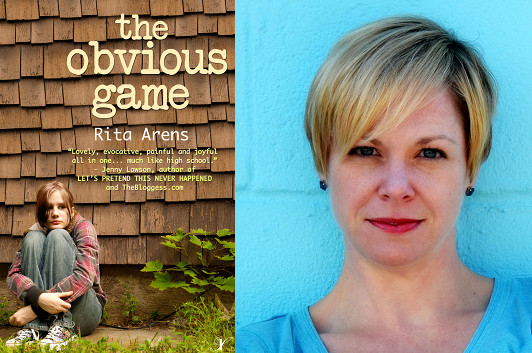Rita Arens: The Project She Couldn’t Quit

photo via Rita Arens
I met Rita Arens at the 2012 Book Blogger Conference, when we both spoke on a panel about monetizing your online writing. She had a lot of great advice about taking things that other people might not see as a very lucrative publishing prospect and putting it out yourself as an e-book—if you know the audience is out there, and that you’ve got something they’re looking for, and you’re willing to put in the work to connect with them, you can do it. (Which is not to say that you’ll get rich doing it, but that’s a separate issue.) Now Rita has released her first YA novel, The Obvious Game, and I thought I’d ask about how her previous self-publishing experiences prepared her to take this next step in her writing life.
Around the time I started working on The Obvious Game, I had just recently really embraced writing publicly about my own experiences with eating disorders. I was a hardcore anorexic from about 17-19 and a disordered eater until about 26. The people in my life at the time knew about it, but it’s not something you could tell from meeting me—I’m a pretty average height and build now for a 38-year-old. I had been really nervous about publishing an essay called “Nicole Ritchie Has Nothing on Me†in my parenting anthology, Sleep Is for the Weak, which came out from Chicago Review Press in 2008, but nobody really said much to me about it, good or bad, and it felt good to just acknowledge I’d been sick for a pretty long time.
Then Dr. Phil said some stupid stuff on a show and I started getting more and more annoyed about the way anorexics were portrayed in the media—either as glamorized starvers who felt no pain or as vain, stubborn crazy people—so I started blogging about anorexia on my personal blog Surrender, Dorothy and on BlogHer.com, where I work as a senior editor.
There was quite a response. I put my email address in my posts and created a category for eating disorders on my blog, and I invited people to email me if they needed to talk. I got tons of emails—about half from the sufferers and about half from their stressed-out families. I titled my young adult novel, which I was about 20,000 words into by then, Empty Plate. I was ready to write down what it really felt like to be anorexic. It’s not a memoir, but my experiences definitely informed Diana’s inner monologue. This book is extremely personal.
It’s been interesting to read the early reviews, because I think the ugliness came through the way I wanted it to—but that garners a different response than a funny parenting anthology like Sleep Is for the Weak.
A bunch of authors have told me not even to read the reviews, but so far I haven’t seen anything I didn’t agree with. The book won’t do the work I want it to do unless it takes the reader down the rabbit hole with Diana. As I was pitching this book to agents and my agents was pitching it to editors, I heard just about every critique I think one could hear—I actually changed the title and rewrote tons of scenes to give the book some levity. The early critiques were particularly brutal. One friend told me she couldn’t believe Rita Arens could write such shit. That was pretty hard to hear. But every time someone said something even remotely useful, I acted on it and revised, even if tears were pouring down my face while I was doing it.
The motivation to write this particular story kept me going on this project. I have a picture book I tried to sell a few years ago and a first novel that I never sold, and I willingly gave up on those projects when it became clear I didn’t care enough to really put in the time. This book I couldn’t give up on, so I just kept going after most normal people would have stopped. I’m glad I did, not only because my passion project got published but also because I learned a lot about how agents and editors think about young adult novels, what they are looking for and what challenges they face internally to sell a book, and I’ll incorporate what I’ve learned into my next novel, which is going to look at the theme of power. It’s tentatively titled The Birthright of Parker Cleaves. And it has nothing to do with anorexia, I promise. I wrote the book I wanted to write about that—now I’m just waiting to see if it does its job.
11 February 2013 | guest authors |

 Our Endless and Proper Work is my new book with Belt Publishing about starting (and sticking to) a productive writing practice.
Our Endless and Proper Work is my new book with Belt Publishing about starting (and sticking to) a productive writing practice. 
